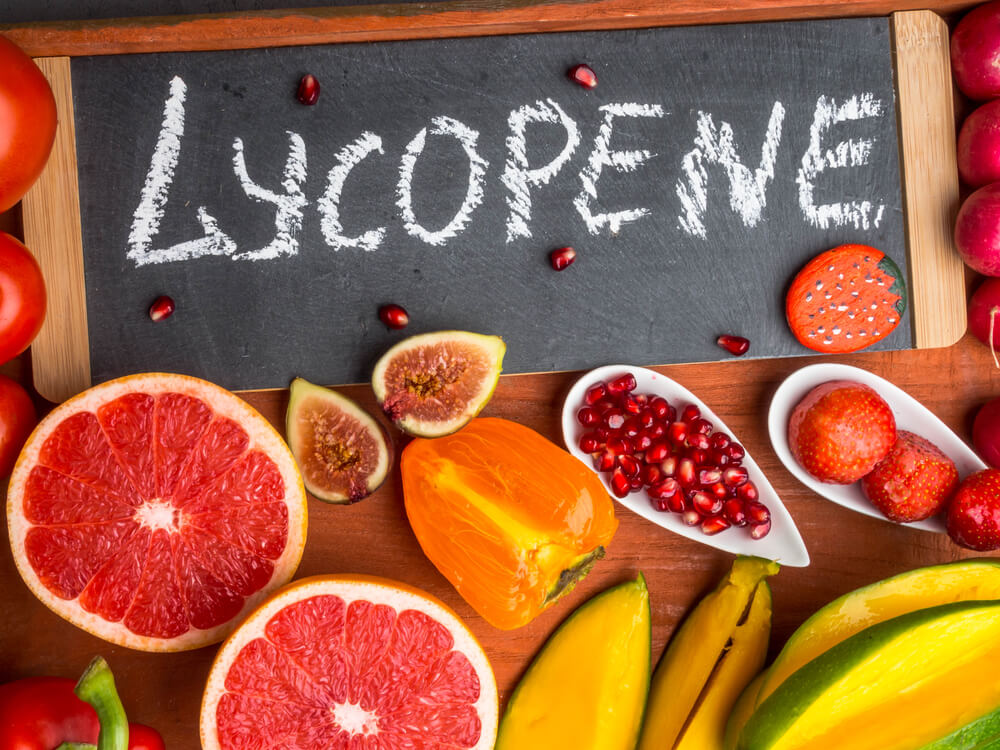Lycopene is a phytonutrient that is far more powerful than many people realize. It’s most “famous” for being present in tomatoes and adding to their nutritional benefits but is also found in other whole foods and truly packs a punch.
For more on this under-the-radar compound, here’s a look at what lycopene is, the top key lycopene benefits, and the best lycopene-rich foods to have in your diet.
What is Lycopene?
Lycopene is a compound found in various fruits and vegetables. It plays several roles within the plants it calls home, including acting as a pigment to give pink and red produce their coloring.
Like so many other plant compounds, lycopene likely has protective properties for the plant as well. It may help to defend the plant or the fruit of the plant from stressors like chemicals, pests, and UV radiation and may even contribute to the aroma of the plant/fruit.
For humans, lycopene is considered a phytonutrient, which basically means a compound produced by plants (rather than the human body) that has benefits for human health.
More specifically, lycopene belongs to a group of antioxidants known as carotenoids. It’s considered a non-provitamin A carotenoid because unlike some other carotenoids (beta-carotene and alpha-carotene, for example), the body does not convert lycopene into vitamin A.
Even though it doesn’t get much time in the spotlight, lycopene has been studied for over 80 years with thousands of research articles published from these studies. Needless to say, the research so far is very impressive.
Top Lycopene Benefits for Health
Has Powerful Antioxidant Properties

As mentioned, lycopene is a carotenoid antioxidant. It’s considered to be one of the most potent plant-derived antioxidants and has the ability to protect DNA, lipids, and proteins from free radical damage (also known as oxidation or oxidative stress).
Free radical damage is implicated in numerous diseases like cancer, heart disease, and Alzheimer’s disease, which makes the consumption of antioxidants like lycopene incredibly important for protecting your health as you age.
Some studies also show that lycopene may go even further than combating free radical damage.
It may, in fact, protect your body (especially your liver) from damage caused by pesticide toxins— including dichlorvos and atrazine— as well as monosodium glutamate (MSG) and Candida albicans.
These findings still need confirmation from human trials, but it does appear that lycopene helps your body to naturally detox.
Naturally Fights Chronic Inflammation
Like most other antioxidants, a top lycopene benefit is its ability to reduce inflammation. This is especially important when it comes to chronic inflammation, which is the harmful type of inflammation that is associated with diseases like diabetes, cancer, arthritis, digestive disorders, and heart disease.
To put it simply, when your body can’t “turn off” its inflammatory response, stress starts to build up on various cells, blood vessels, and tissues. This is what some experts believe eventually leads to the development of disease.
Studies have shown that lycopene can help to calm inflammation by reducing proinflammatory mediators and proinflammatory enzyme activities in both lab and human studies. It also appears to combat inflammation within cells by neutralizing free radical activity.
Interestingly, some preliminary research indicates that lycopene may be able to reduce neuropathic pain as well— perhaps in part because of its anti-inflammatory effects.
Possesses Anticancer Properties

One of the best reasons to consume more foods rich in lycopene is the anticancer effects this phytonutrient possesses.
Both animal and test-tube studies have shown that lycopene can slow the growth of breast and prostate cancer cells as well as limit tumor growth. It also may inhibit or prevent the growth of renal cell carcinoma, which is a type of malignant kidney tumor.
Human observational studies on lycopene and cancer have been incredibly promising, too.
In one large study with over 46,000 participants, a diet high in lycopene-rich tomato products was associated with as much as a 30% lower chance of developing prostate cancer. Similar studies have had the same results and suggest that the average risk reduction for prostate cancer from consuming lycopene is around 9%.
Other research has also found a connection between higher lycopene consumption and a reduced risk for lung cancer.
Very Supportive of Heart Health
Lycopene can benefit your heart in a number of ways. And since cardiovascular disease remains the #1 cause of death worldwide, this may be one of lycopene’s most outstanding properties.
To start with, lycopene has shown an ability to reduce total and “bad” LDL cholesterol levels and increase “good” HDL cholesterol levels. It can also help improve blood pressure, which is another huge risk factor for heart disease when it becomes elevated.
In another clinical study, lycopene was able to improve endothelial function in patients with cardiovascular disease, which is highly impressive. Endothelial function refers to the health of the inner lining of your blood vessels, and better function is usually connected to a healthier heart.
Even more amazing is the fact that several studies have linked higher blood levels of lycopene to a lower risk of dying prematurely from heart disease or metabolic disease.
In some cases, the risk of dying prematurely was reduced by as much as 39%!
May Decrease Stroke Risk

Strokes rank fifth on the list of leading causes of death in the U.S. They occur from either a ruptured artery or a blocked artery that prevents blood from flowing to the brain. The result in both cases is brain damage that can cause lasting issues and may lead to death.
Because high blood pressure and high LDL cholesterol are both risk factors for a stroke, it’s not surprising that lycopene may have benefits for stroke prevention— something that research has so far supported.
In fact, one of the largest studies on lycopene and strokes to date had some very surprising results.
In it, researchers followed over 1000 adult men for 12 years and monitored their blood levels of certain nutrients, including lycopene, beta-carotene, vitamin A, and vitamin E. At the end of the study, only lycopene showed positive effects for stroke risk and reduced the risk of any kind of stroke by 55%!
Other studies have had similar results, although researchers still call for larger trials to confirm these incredible findings.
Protects & Maintains Youthful-Looking Skin
Surprisingly, another top lycopene benefit is skin protection— or more specifically, protection against the damaging effects of UV radiation.
As you may know, UV damage to your skin (technically known as photodamage or photoaging) is one of the biggest accelerators of premature skin aging. This is because UV radiation does damage deep at the cellular level, which shows up later as wrinkles, dark spots, uneven skin tone, etc.
The good news is that lycopene helps protect your skin from the effects of photodamage, most likely because of its antioxidant properties. This may help slow or prevent signs of aging from forming as a result of sun damage.
The same study also found that procollagen (a precursor to collagen) levels increased after lycopene consumption, suggesting that this phytonutrient may have even more anti-aging effects for skin.
Supports Eye Health & Vision

Carotenoids have long been known to support eye health. Lutein and zeaxanthin are the two most often highlighted for their ability to protect the macula from damage, but research shows that lycopene promotes healthy vision as well.
Perhaps one of the biggest benefits of lycopene (and other carotenoids) is the potential to help protect against age-related macular degeneration (AMD), which is the leading cause of blindness in older adults. In one study, higher levels of zeaxanthin and lycopene specifically were associated with a lower risk of AMD.
Other research also shows that lycopene may help prevent or slow the formation of cataracts.
Interestingly, the researchers in the study found that lycopene appeared to slow cataract development by restoring levels of glutathione (a powerful antioxidant) and malondialdehyde (a marker of oxidative stress) back to normal.
This suggest that lycopene mainly protects the eyes with its antioxidant power and, again, highlights the importance of regularly consuming antioxidants in your diet.
Good for Your Brain
Yet another key lycopene benefit involves your brain— one of the most important organs in your body.
Antioxidants in general are critical for reducing inflammation and free radical damage in the brain, keeping it healthy and sharp as you age. Accumulating research highlights carotenoids as a specific group of antioxidants that possess neuroprotective properties and may improve cognitive function.
To look at lycopene specifically, studies have found that it may inhibit neuroinflammation and oxidative stress in the brain that have been linked to Alzheimer’s disease. It also improved cognitive function and memory in animal research.
In addition, at least one study has shown that higher lycopene intake is associated with better cognitive function at an older age.
Overall, lycopene has shown a lot of potential for slowing or preventing Alzheimer’s disease and age-related cognitive decline, but more research is still needed to confirm preliminary findings.
Supports Bone Health

Your bones rely on nutrients like calcium, vitamin D, magnesium, and vitamin K to stay strong and dense. However, antioxidants like lycopene also play a role in keeping bones healthy by protecting their integrity.
Essentially, research has shown that the antioxidant activity of lycopene appears to slow down bone cell death, which leads to improvements in bone mass and bone strength. This primarily happens because lycopene combats oxidative stress that contributes to bone deterioration.
To support these findings, other studies have found a connection between higher lycopene and carotenoid intake and better total-body bone mass.
Recent research has even confirmed that lycopene has positive effects on osteoblast cells (the cells that form bone tissue) and may prevent bone loss in postmenopausal women.
May Improve Fertility in Men
Infertility is a frustrating condition that affects about 10-15% of couples in the U.S. and worldwide. There are a variety of underlying issues that can decrease fertility in both men and women, many of which are connected to hormone health.
As some research has shown, lycopene may benefit male fertility, specifically by increasing sperm count and viability and lowering oxidative stress biomarkers that are commonly seen in infertile men.
More quality clinical trials need to be done to truly determine how effective lycopene can be for improving male fertility, but the few already conducted have found that lycopene can improve sperm parameters and pregnancy rates, which is very promising.
What Foods Have Lycopene? Top Lycopene Rich Foods

Because lycopene is not an essential nutrient, there is no “official” recommendation for how much you should consume daily. Most studies have found that an intake of at least 8-21 mg per day is enough to be beneficial.
The good news is that you can’t really overdo it on lycopene when you get it from food sources, so feel free to fill up on the following lycopene-rich foods:
- Sun-dried tomatoes (45.9 mg per 100 g)
- Tomato puree (27.8 mg per 1/2 cup)
- Tomato juice (22 mg per 1 cup)
- Fresh tomatoes (3.2 mg per medium-sized tomato)
- Watermelon (13 mg per cup)
- Guava (5.2 mg per 100 g)
- Pink or red grapefruit (1.7-2 mg per half grapefruit)
- Papaya (1.8 mg per 100 g)
- Red bell peppers (.5 mg per 1 cup cooked)
Some foods with lower amounts of lycopene include:
- Pomegranate
- Cranberries
- Red cabbage
- Blood oranges
- Red carrots
- Persimmons
Tips for Boosting Your Lycopene Intake
Along with simply consuming more foods that are high in lycopene, there are a few other key ways to boost your overall intake to get the most benefit from this valuable compound.
First, research has shown that heating tomatoes increases their lycopene content compared with eating them raw. Cooking them at a low temperature (around 190°F) for 15-30 minutes appears to be ideal for maximizing lycopene.
Something else to keep in mind is that lycopene is a fat-soluble phytonutrient. This means that consuming it alongside a healthy fat will help your body absorb it more effectively. You might, for example, cook tomatoes with a small amount of olive oil or pair them with avocado in homemade guacamole.
Another helpful tip is to avoid taking calcium supplements with a lycopene-rich meal. Concentrated amounts of calcium (as would be present in a supplement) have been shown to decrease lycopene bioavailability.
Finally, leave the skin and peels on your fruits and vegetables as often as possible— but be sure you are eating organic produce when you do so to avoid pesticide residue!
The outer skin/peel of fruits and veggies is where most of the nutrient content is concentrated. This includes carotenoids like lycopene, so you can boost your intake quite significantly simply by eating unpeeled produce.
Follow these tips for increasing lycopene intake and fill your diet with lots of lycopene foods to make sure you are reaping the benefits of this outstanding antioxidant compound.


